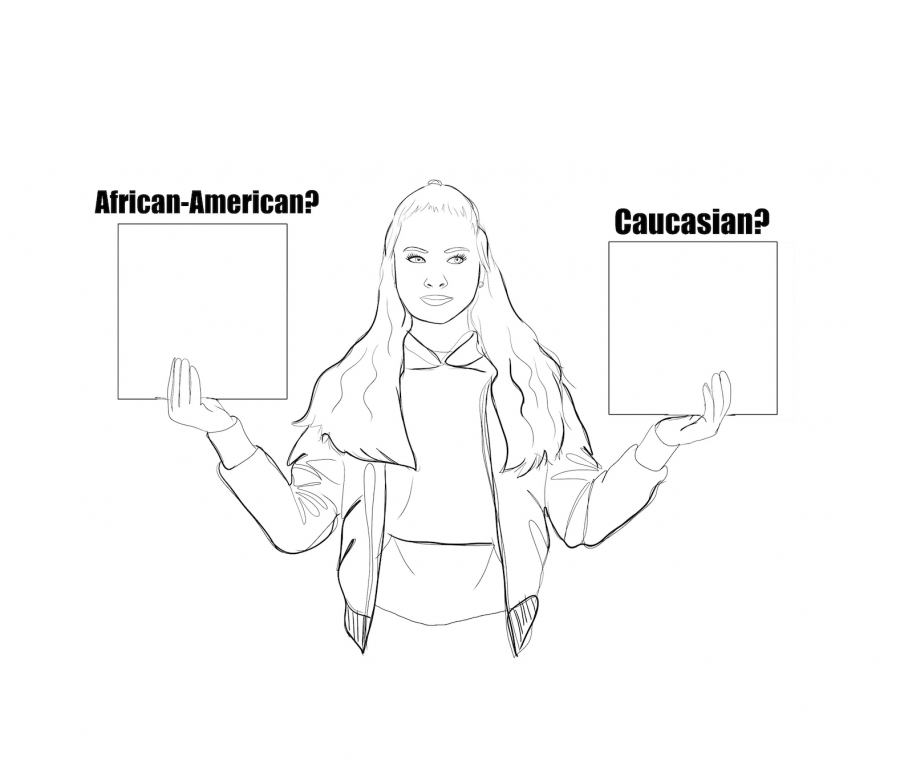Growing up in a racially-mixed household, I never truly felt the need to explicitly define my race until the pressure of college applications came up. Like me, many other high school students find themselves faced with the decision of which box to check once they reach the “race” category.
While my father is half African-American and my mother is fully Caucasian, I identify as Caucasian. Over the years, whenever someone learns about my family’s multi-racial background, their response is almost always something along the lines of “No way, you look so white!” or “You’re so lucky, you get to put ‘black’ on your college application!” I know they are often meant lightheartedly, but comments like these have led me to consider whether I should put down a race that is in my DNA, but not necessarily one I identify with.
If you were to look at me, you would see my pale skin, blue eyes, and light brown hair; you’d never guess that I am anything but white. Because I do not have my father’s darker skin, I don’t experience the same discriminative struggles that he does.
My father grew up in Kansas and attended a predominantly white high school.
“I definitely faced many barriers early in my life, especially growing up where I did,” he said. “The challenge that I faced was being between two worlds. I looked one way, but had been socialized another way, so I was expected to fit into two different groups, but didn’t really fit into either.” In my father’s life, his battle with establishing a racial identity played a major role in defining who he was, whereas in my life, this aspect has not had such a grand impact.
Considering my dad’s lived experience, the decision became easy for me. I have not endured the same level of race-based prejudice that he has, so it is partially for this reason that I am choosing to solely check the Caucasian box.
But what about other students? Is there a clear ethical standard for how to respond to this question? The truth is that everyone’s justification is different.
“It depends on the person,” Sareen Mokha said. “For some people, it’s about their blood, for others it’s the way they grew up.” Mokha identifies as Indian and plans to check “Asian” on her applications.
“I think that if you’re over 20% of a race, then you could be allowed to claim it,” said Alex Espinosa, who identifies as Hispanic.
Chris Clark plans to check the “other” box on his applications. “I shouldn’t be forced to choose just one race.” From his perspective, college applications can be too confining. Chris’ father is African American and his mother is Asian, and he identifies with both races.
In search of statistics, I called the admissions departments of a number of colleges and universities, and came to an interesting conclusion; there is no minimum percentage that qualifies a student to claim a minority race on their college application. This is where the lines get blurred. Although students might be tempted to fabricate a race, it is not as simple as checking a little box. By doing this, students decrease the number of slots available for applicants of true minority status.
In 2003, the U.S Supreme Court ruled that the use of race quotas in the process of vetting students was unconstitutional, but also ruled that schools could continue to use race as a factor in admissions decisions. According to the Washington Post, schools can no longer set aside a specific number of slots for students, but often have a goal for the racial makeup of their entering class. If a student falsely reports their identified race when applying, they risk taking the place of another deserving minority student.
Upon learning this information, I decided to ask my father–a person of color and a parent–which race he would advise me to claim.
“Check whichever race you feel most comfortable with, knowing that you would have to justify it,” he said.
His advice seems to perfectly sum up my internal debate. For me, even though I am a quarter African-American, I wouldn’t feel right checking the “black” box on my college applications, when I haven’t experienced the struggles associated with being black in the United States. I still embrace my heritage and I am not neglecting a part of who I am. My decision is out of respect, knowing that because of my appearance I have experienced privilege. To make someone narrow down their racial and ethnic background to one category, is simply a lot to ask.









